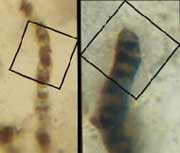Articles and reports from the Life Sciences and chemistry area deal with applied and basic research into modern biology, chemistry and human medicine.
Valuable information can be found on a range of life sciences fields including bacteriology, biochemistry, bionics, bioinformatics, biophysics, biotechnology, genetics, geobotany, human biology, marine biology, microbiology, molecular biology, cellular biology, zoology, bioinorganic chemistry, microchemistry and environmental chemistry.

A robot submarine expedition under the Antarctic sea ice has discovered a major food reserve in the Southern Ocean. The findings, reported this week in SCIENCE, show a dense band of the shrimp-like krill under the ice, five times more concentrated than in open water. The importance of sea ice as a nursery for krill – key food for penguins, whales and fish – has long been suspected, but these are the first large scale measurements.
Scientists from the British Antarctic Survey, the Open Univer

A molecular pump that helps to keep cells flush with energy has been visualised by scientists at Imperial College, London.
The structure of the pump, a key enzyme in bacterial respiration, reveals for the first time one of the molecular mechanisms that underpins cellular respiration, and confirms a Nobel Prize-winning theory proposed over 40 years ago by Briton Peter Mitchell.
Professor So Iwata and colleagues from the Laboratory of Membrane Protein Crystallography, Imperial Colleg

A team of chemists and physicists at the Universities of Liverpool and Oxford have shown that hydrogen transmits magnetism. This discovery could be the first step to a new class of magnetic materials, and opens up a new field of chemistry.
The team, headed by Professor Matthew Rosseinsky of the Department of Chemistry, University of Liverpool, and including Dr Stephen Blundell of the University of Oxford, has prepared a new magnetic oxide material in which for the first time the dominant ma

Early humans came out of Africa again and again.
There were at least three major waves of early human migration out of Africa, our DNA suggests. Apparently the wanderers made love, not war: gene patterns hint that later emigrants bred with residents.
Human origins are contentious. Most researchers agree that there have been several major migrations out of Africa. Some hold that human populations in many regions evolved in parallel after Homo erectus left Africa around two mi

Gloves are coming off in ancient bacteria bust-up.
A claim to have found evidence of the oldest living things on Earth is being fiercely contested. The argument looks set to run and run, and no one may win, but it may lead to a better understanding of the origins of life on our planet.
The debate is academic, but its implications are not. The ’fossil bacteria’ in question are around 3.5 billion years old. That’s roughly one billion years older than the only confirmed fossil

Under the agreement, the two companies will work to develop affinity-based products for use in the production processes for protein-based pharmaceuticals. The development of these products will be based on Affibodies™, a novel class of small, robust affinity proteins designed to bind desired protein targets. Financial details of the agreement were not disclosed.
“The use of Affibodies™ opens up new possibilities for large-scale protein purification for production of protein based pharmaceuti